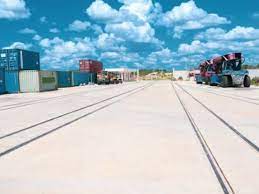The construction of the Kwala Dry Port in Kibaha, Tanzania, is approximately 95% complete. This came to light when a delegation of Customs Officers from the Democratic Republic of Congo (DRC) led by their Director of Customs and Excise Mr René Kalala Masimango visited the project site.
The delegation commended the government of Tanzania led by President Samia Suluhu Hassan and the Tanzania Ports Authority (TPA) for its commitment to the completion of the project.
When fully complete, the project will deliver a port equipped with rail, water, communication, and electricity infrastructures. These infrastructures will enable easy operations within the port and the surrounding area.
15.5 kilometers of highway in Morogoro, Vigwaza area will also be delivered as part of the project. The highway is being built by ESTIM Construction Co. Ltd under the supervision of the Tanzania National Roads Agency (TANROADS). The highway will reportedly facilitate the transportation of cargo in and out of the Kwala Dry Port.
Significance of the Kwala Dry Port in DRC
Sitting on a 10-hectare piece of land allocated by the government for Handling DRC cargo passing through the Dar es Salaam Port, Kwala Dry Port, once operational will help to reduce congestion at Dar Port. This is because it will store on-transit cargo to neighboring countries of Burundi, Rwanda, DR Congo, Uganda, Zambia, and Malawi.
Additionally, a new era of ferrying cargo by train from Dar es Salaam port will be ushered in once the dry port is implemented. There are long queues of long vehicles that congest Dar es Salaam port every day to load containers. Therefore, Kwala Dry Port will relieve roads and the Dar es Salaam port and completely handle the traffic menace in the region.
Also Read: Tanzania to back construction of a commercial and logistics centre in Dar es Salaam
The Kwala Dry Port will further create many employment opportunities for the local community in the coastal region of Tanzania. Heavy traffic jams on the city roads will be relieved and thus trade will be highly boosted with less time for transportation and handling of imported goods.
